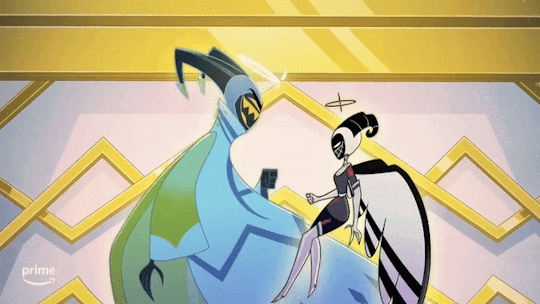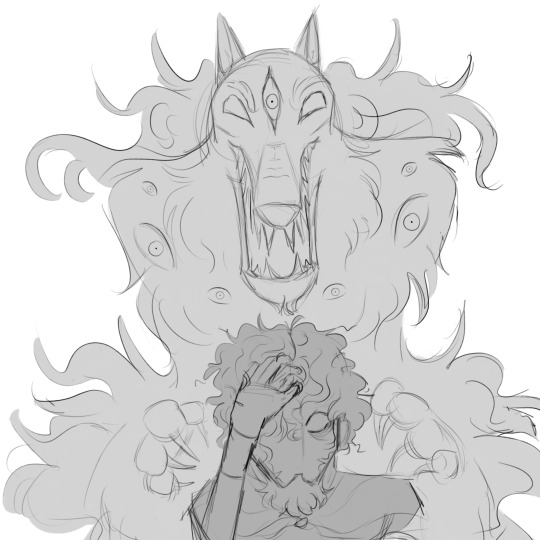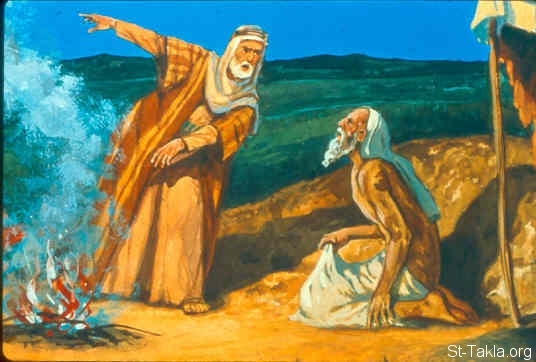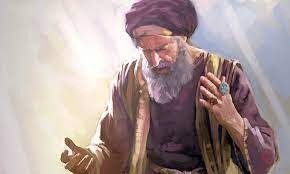#bible stuff
Text
71 notes
·
View notes
Text
Hi so I actually specifically made this blog so I could talk about this lol. And disclaimer yes I know Hazbin isn’t biblically accurate let me have fun
So the fact that Adam has NO IDEA what gets you into heaven is fascinating to me. Because the apple, which is the entire reason there is a hell at all, was supposed to give them THE KNOWLEDGE OF GOOD AND EVIL. Like, that’s the whole reason why they weren’t allowed to eat it. Of all people, Adam should know what’s good in the HH universe. The other thing: Adam wears clothes, but he clearly has no shame at all about sex or nakedness or anything of the sort. He’s not the same Adam where he and Eve would be covering themselves in shame for their nakedness.
So either a. WHERE DID THE KNOWLEDGE GO? or b. What did the apple ACTUALLY give them?
And why don’t Sera or Emily know what allows a person to go to heaven either?
I like to think that Lilith and Lucifer still know - and that Lucifer is working on the assumption that all sinners know like they should and Lilith used the knowledge to get into heaven. That’s why I think Lucifer really didn’t like sinners at first, he was like, really? I gave you the knowledge on how to avoid this and you came down anyways? You deserve what you get because you knew what would happen.
And that’s also why I think Adam got into heaven: he messed up, but he was given the knowledge of how to redeem himself before he died. It can’t just be because he was the first man, Lilith was the first woman and got sent to hell anyways. I think Lilith just used her knowledge to get back into heaven after death, instead of before like Adam.
Someone higher than Sera has to be responsible. There may not be a God in the hazbin universe, but there has to be SOMETHING that decides who goes where, and that something or someone seems to have pulled the rug out from under a lot of people.
I also really think it would be interesting if Charlie mentioned to Lucifer that not even Adam or Sera could tell her who goes where and he’s fucking SHOCKED

#hazbin hotel#lucifer morningstar#lucifer#charlie morningstar#hazbin hotel adam#hazbin lucifer#hazbin sera#hazbin lilith#hazbin charlie#hazbin spoilers#adam#hazbin lute#Charlie#bible stuff#headcanon#theory
45 notes
·
View notes
Text
In ancient times, Nineveh was told to repent or be destroyed for their wicked ways.
An eclipse happened when Jonah preached. He warned of a 40 day deadline. They briefly repented- even the cows were saved. Sometime within 100 years, judgment came.
The Great American Eclipse, which will go through 7 cities named Nineveh, a city named Rapture, a city named Magog, and Mars Hill, is coming on April 8th, 2024. Rockwell, Texas, which provided red heifers to Israel (important for temple sacrifice ceremonies), is also in the path. There is also a Jerusalem in the path.
With the eclipse comes the “devil’s comet”. On April 4th, 2024, there will be a planetary parade.
In 2017, the solar eclipse went across seven cities named Salem (short for Jerusalem, btw).
Know this- what I am saying could possibly be the most important things I have ever said. I don’t think this is coincidence. Especially considering world events. All that stuff in Israel, Hamas says they were trying to assassinate the cows that Texas gave them. Keep that in mind.
It could be nothing. But it also could be something. I’m leaning to something. Way too many signs in the sky on that one for me to ignore personally.
31 notes
·
View notes
Text

Just a reminder to anyone that needs it. :)
#bible stuff#christian#bible#scripture#christianity#positive thoughts#positivity#encouraging#reminders#be kind to yourself#christian faith
30 notes
·
View notes
Text
Why David is my favorite biblical figure
He took on Goliath because he trusted in God’s strength and power and because he was sick of his people backing down (THEY WERE ISRAELITES FOR GOODNESS’ SAKE!! GOD HAD THEIR BACKS!!)
He was flawed and God shows us his humanity and sinful nature (whereas others He doesn’t show us as much). He took his eyes off God when fleeing Saul and leaned on his own understanding (acting crazy to get away from the Philistines). Committing adultery with Bathsheba and murdering her husband Uriah (one of his own mighty men😭) to cover up his sin.
HOWEVER: whenever God revealed his sin he was genuinely broken-hearted for disobeying God and immediately repented and asked for forgiveness.
I relate to him. Many of his psalms show he battled depression and despair. Many times he asked God “Oh my God, why have you hidden Your face from me?” He was a sensitive man who felt his emotions deeply.
He was good example. He had every right to hate and want to kill Saul but he didn’t. Instead he prayed for him, he respected his position (“Who shall lay a hand on the Lord’s anointed?”). He had three opportunities to kill him but he refrained; showing obedience and reverence to God Himself.
He made mistakes but God still chose to use him and his line to bring forth The Messiah and His ultimate plan for redemption (and you can see how Satan tried hard to destroy the line of David)
He was 30 years old when God’s plan for his life finally began (that gives me hope that mine will begin eventually)
He had so much to fear, so many reasons to give up but he didn’t. Instead he lifted his eyes to God and trusted Him and His timing. Trusting Him to take care of him and and to fight for him.
He was a man after God’s own heart and is one of the ‘Heroes of the Faith’
Fun fact about Uriah: He was a Hittite, but being that he had a Hebrew name meant that he lifted his eyes to the One True God and served Him; changing his name to “My light is Yahweh”. I just thought that was neat! The man came to God under David while being one of his mighty men. He’s in heaven! And doesn’t even remember what David did. They’re probably hanging out and praising Jesus together right now🥰
I just love the account of David so much🥰 It brings me comfort, and joy.
#I just love David so much#always have and always will#ugh! and his psalm where he says that by God he can bend a bow of bronze and leap over a wall’🥰#that just makes my heart and brain go 🤯🤩😲#David#king David#Bible stuff#my faith
15 notes
·
View notes
Text

A very tiny church. ⛪️✝️🌷
#tiny house#tiny home#tiny houses#small home#small church#tiny church#travel photo blog#travel photo diary#travel photography#easter sunday#palm sunday#lent 2023#pascha#resurrection#resurrection sunday#bible stuff#bible study#bible camp#easter bunny#easter 2023#happy easter#happy easter 2023#he is risen#jesus christ#jesus is coming#rising up#rise up#passover#pascoa#new testament
37 notes
·
View notes
Text
Who wants to see what happens when a former theology student reads the Locked Tomb books?
Obviously, major spoilers ahead for Nona the Ninth.
I'm not kidding. This is a long one. I won't be offended if you put this one aside and wait until you've go the time necessary.
All of the dream sections with John and Harrow begin with “John X:X”. A friend pointed out that the numbers create a message through a basic 1=A code: The Tower has Reactivated. Which is very cool and awesome. But I couldn't help thinking there had to be more. There's always more with this woman.
So I did what any sane person would do and I started comparing the listed titles with their corresponding verses in the Gospel of John. Like, the bible one.
See, back in the day I actually went to theology school. I was gonna be a pastor. I literally took a full semester class on the Gospel of John. If anyone is equipped to puzzle this out, it's me.
I wanna kick off with something important here. I'm about to start throwing out some absolutely wild shit here, and I don't know how much of it was fully intentional. Tamsyn Muir has put so much work into this series and I'm willing to give her full credit. But I'm not claiming any sort of full knowledge of authorial intent. This is analysis and theorizing. Some of this will be interesting, some of it will be relevant, but all of it is just me going buckwild on a book that deserves to be gone wildly buck on.
So here's the verses we're working with, including their related page numbers. Below that, I've included some notes on the significance of the verse and connections between that chapter and the gospel itself, at least as far as I can glean. There will definitely be stuff I've missed, stuff I've read too much into, stuff I've straight up read wrong. Feel free to add in anything in the replies and whatnot.
John 20:8 (pg. 13)
Finally the other disciple, who had reached the tomb first, also went inside. He saw and believed.
The major connection here is obvious. The inciting incident for the series of books is Harrow opening the Tomb, seeing the Body, falling in love, all that.
Paralleling this, Gideon is getting to look in on the ships, and Mercy is reporting to John Gaius that everything is going sideways. The disciples are witnessing and reporting back.
It also has to be noted that the narration points out that John Gaius in the dream is mostly talking as if this were meditation, just to hear himself talk. And the gospel of John leads with “In the beginning was the Word, and the Word was god” and yadda yadda. Gospel John (we'll call him Author for sake of ease) was all about this association between God/Jesus and speech.
It should also be noted that the Locked Tomb doesn't make anything easy because John Gaius is equal parts analogous for Jesus and God (not to mention Adam). And yes, I know that theologically speaking, that tracks, but narratively it makes things very difficult to talk about. So sue me. It's complicated.
Finally, I'm compelled to go on a quick diatribe about how the gospel of John was the only book to skip the details of Jesus' birth and early life. The Author didn't care about that. He cared about the miracles, he was fucking horny for the miracles. Which makes sense, because we're about to hear all the miraculous things John Gaius did. Oh, and the horrors. Can't forget the horrors.
John 5:20 (pg. 73)
For the Father loves the Son and shows him all he does. Yes, and he will show him even greater works than these, so that you will be amazed.
This is the first time John Gaius performs a miracle, and it's only the beginning. Pretty straightforward.
A small touch here I like is John Gaius in the dream calling Harrow his Beloved.
As John gets more into his mania, the people around him start worrying whether he's eating. It's an issue shared with Harrow and Nona. And it's actually something the disciples ask Jesus at one point in John 4. Granted, that's mostly so that Jesus can go into a lecture about being fed by the Spirit. But still, it's worth noting.
John refers to Gideon as his “voice in the wilderness” which is a direct reference to John the Baptist. Do you see the problem here? There's so many fucking Johns to talk about. Epithets aren't just helpful,they're a necessity. Anyway, this connection makes sense, because it's speculated that John the Baptist was close to Jesus because they were cousins. Much the same way that John Gaius and Gideon grew up together, thick as thieves.
There's another interesting quirk here that I really like. At the end of this section, John's speech cuts off suddenly. That doesn't happen anywhere else in the dream segments as far as I can recall. Now obviously in context, it's because Nona's being woken up suddenly in a new and jarring way. But it does make for some fun connections where the Gospel of John cuts things off without warning. More on that later.
(I really tried to figure out if there was any significance to the power being cut off at 6:01 but I'm drawing a blank thus far. Alas.)
John 15:23 (pg. 98)
Whoever hates me hates my Father as well.
Fewer links to the actual verse itself this time around. The closest I can figure is that some of John Gaius' friends are pretty weirded out by what he can do at first, which...y'know, fair enough. And maybe he takes that a little personally.
John Gaius in the dream naming all the detritus he sees, it has a little bit of an Adam feel to it. Naming all the animals. It's small but it's there.
It takes three days for everyone to believe. Three, big number, biblically. This is also the first time we see a developing link between one of John Gaius' friends and Jesus' disciples. Augustine is kind of his Andrew. He was one of the first to join up, one of the most loyal, and he brought his brother into the fold (just as Augustine later brings in his hedge fund manager brother). Not all of the other characters are as strongly linked to the disciples, but there's some interesting bits and pieces.
Oh! This is also the first time John Gaius cries openly. And the famous “Jesus wept,” comes from the gospel of John.
With the raising of Ulysses and Titania, we get two more interesting links. First, we've got our Lazarus moment. Granted, it's much more halting and complicated than the way Jesus did it, but we've got dead bodies moving. But what I find much more important is the massive clue in the form of their names. In each of the dream segments, we don't actually get full names for the major players. It's always X―, including whoever Ulysses and Titania were before he revived them. Which means that all of John Gaius' crew had different names before their resurrections. And Jesus definitely liked bestowing people with new names. One of the biggest examples? Simon Peter, who Jesus declared to be Cephas, his rock. Simon Peter, Andrew's brother. The hedge fund manager, Augustine's brother. His cavalier, his rock.
John 5:18 (pg. 127)
For this reason they tried all the more to kill him; not only was he breaking the Sabbath, but he was even calling God his own Father, making himself equal with God.
Again, this one isn't directly tied to its particular section. But to the narrative as a whole, it lines up better. In this section, John Gaius is starting to really perform some crazy shit, and streaming it out for people to see. Word is spreading, some are doubting, others are getting hyped, and eventually world leaders start getting aggressive.
This is the first time where John Gaius mentions the absurdity of his company that will come up on occasion. This is another case where there's a tenuous link between his crew and the disciples, who were composed of fishermen, a tax collector, a religious/political zealot, a wealthy man, a poor/homeless man, and possibly a sex worker (depending on whether you subscribe to that interpretation).
John 8:1 (pg. 188)
but Jesus went to the Mount of Olives
Here's the first time where things get really interesting. The end of John 7 and the beginning of John 8 are weird because they don't show up in every single early manuscript. There's been debate for centuries about whether they should even be in there. And I'm glad it's still in there, because it's where we get Jesus defending a sex worker and his important “let he who is without sin cast the first stone” banger. Jesus gets a lot of bangers in this gospel.
Pyrrha gets a fascinating moment here when she betrays the police. It marks her as an inverted Judas figure. Even by the time of Harrow the Ninth, she swears herself to John Gaius when everything goes down toward the end. Granted, some of that shifts through this book.
John 19:18 (pg. 219)
There they crucified him, and with him two others—one on each side and Jesus in the middle.
Sadly this particular verse doesn't yield much. They can't all be winners.
John Gaius in the dream gets mad over the nature of souls (for obvious reasons later revealed) and storms around the yard three times. Big number, etc.
Some of the world leaders lie about sending out twelve ships with a guiding beacon. This one's obvious and I think that's on purpose. It's this noble image, a heroic crew of twelve, and it's all a big sham. There is no salvation, and I think that's a big theme here. Things are going to get worse, and having faith in the Twelve and the One isn't going to get you to safety.
We get a mention of cows in this chapter, John gets told cows watch sunsets. As near as I can tell, this is sort of an inversion (or maybe a send-up) of the way the bible talks about sheep, lambs, goats, etc. Whichever way you look at it, people are livestock. And John using livestock to make a defensive barrier for himself? It just proves he's willing to make big sacrifices, and foreshadows the much bigger destruction he'll be causing later.
John 5:1 (pg. 270)
Some time later, Jesus went up to Jerusalem for one of the Jewish festivals.
On first blush, this one doesn't look like much. However, chapter 5 of John actually is pretty relevant. This is the scene where Jesus heals several disabled people, which just gets him in trouble with the local leaders.
It's a small thing, but the barbecue scene here does have a real Last Supper vibe to it. Low-key party while facing down a major crisis.
Here we see another connection to the biblical disciples, but with a big change. In the gospel of John, the disciples are often blank pages, and many of them aren't even explicitly named. They question Jesus, but only in the same way you expect someone to say “who's there” in a knock-knock joke. They're the set-up so you can speak on a subject. They're the novice asking the monk about the secret of the universe. John Gaius' crew? No fucking way. They stand their ground, they shout, they question him and push him and prod him. They call him out. And John doesn't have all the answers. They're all imperfect, and they're all screwed.
Someone uses the “cow defense” against John Gaius and his people again. There's a pattern here developing of excuses.
John 3:20 (pg. 279)
Everyone who does evil hates the light, and will not come into the light for fear that their deeds will be exposed.
This is the section when John Gaius finally decides to embrace the necromancer vibe. He embraces the darkness in order to try and save the world. Pretty clear reversal here of the dark hero, taking on the shadow for the sake of true good. Also worth noting this comes shortly after the most famous line there is, John 3:16. For god so loved the world that he gave his only son etc. John Gaius so loved the world that he...does a lot of really fucked up shit.
Yet another cow fact. They recognize one another. The cows, man. Think about the cows.
John 9:22 (pg. 318)
His parents said this because they were afraid of the Jewish leaders, who already had decided that anyone who acknowledged that Jesus was the Messiah would be put out of the synagogue.
In this chapter, Jesus heals a blind man who vouches for him, even though the people in control are like “Hey that dude's no good”. John Gaius is also finding out that it's no longer just him and his little family that are in trouble. Anyone trying to join up with him is also put on a wanted list. Things are getting more dire and a lot of people want him dead.
Granted, John Gaius ain't doing himself any favors by killing a lot of people.
“Guys as careful as me don't have accidents.” This one's interesting because another facet of the gospel of John is that the Author really leaned into Jesus being a divine figure. Other books tried to paint him as being human like the rest of us. But the Author was like “oh, no thank you, this guy was capital-G-God and he did a lot of crazy stuff and you just gotta deal with it.” Everything is in control, everything is preordained, and god don't make mistakes. God does exactly what god's gonna do.
John 1:20 (pg. 395)
He did not fail to confess, but confessed freely, “I am not the Messiah.”
This one's a little complicated, because the line is actually coming from John the Baptist. Who was indeed not the messiah. But it does pair well with Mercymorn chewing John Gaius out. “John, your problem is that you care less about being a saviour than about meting out punishment.”
To top it all off, as John Gaius is putting his final Hail Mary (haha) into play, he says “cows exhibit mourning behavior for other cows.” He's parroting their words right back at them to excuse his behavior.
He's not the messiah. He's a necromancer.
John 5:4 (pg. 432)
[No text, Some manuscripts include here, wholly or in part: paralyzed—and they waited for the moving of the waters. From time to time an angel of the Lord would come down and stir up the waters. The first one into the pool after each such disturbance would be cured of whatever disease they had.]
As you can see here, this is maybe the most interesting part. And it makes sense being the final verse. This is another section where the text doesn't appear in all of the manuscripts. Depending on which version of the gospel you're reading, this doesn't exist. And we're reading a dream. We're reading a story that does and doesn't exist.
And what's happening here? Harrow is finally realizing that even if she loves God (even if that's only because of her religious devotion) she can't keep worshiping blindly anymore. She's broken and she needs healing. So she steps into the water in search of a cure for her disease. And just maybe, in Alecto the Ninth, she'll find what she's looking for.
#nona the ninth#the locked tomb#ntn spoilers#seriously im spoiling so much here#long post#very long post#bible stuff#nerd stuff#bible nerd stuff
125 notes
·
View notes
Text
Writing a book wow ✍️
Alright, lemme introduce you to a project I’ve been working on for a few years now 😘
I have been very dedicated to it, and it’s been through many, MANY changes because of the concept for it, which has been hard for even me to develop and have it make sense lol
Also here’s some art I made for it, hehe

This novel in question is, “Saul,” a fictional retelling of, well you know, King Saul 🥶 Strictly through his perspective and how he sees the world around him, which is shown in a very symbolic way. Everything about this story is symbolic with it presented through symbolic imagery that Saul experiences. Within the story, Saul would go through seven visions, given by Ze’ev, his evil spirit, detailing his state of mind and his gnawing grudges.
Basically, this story brings light to Saul’s mentality in the Bible in other means of interpreting it, in which Saul is honestly never sane and he has a lot of issues lol. Also, the story goes through his entire life, and I mean going back to when he’s around 15, which is where the story starts (other than his traumatic flashback that I’m not going to talk about loll) So it’s an origin story as well, but it ties into the whole idea of what drives Saul forward in the life he lives.
Also, there’s generational trauma 🥶 that explains Saul’s abuse for Jonathan (although there are many more aspects to it, Saul’s past is partly the reason for Saul’s abuse) in which Saul’s father, Kish, is the biggest asshole you’ll ever meet lol. And yeah, there’s a reason why, and yet, he’s an asshole through and through and there’s no redemption for him. Kish doesn’t want to be associated with his son which spirals into endless abuse and neglect (kind of explains why Saul has little to no confidence in himself and is constantly paranoid).
There are also prominent characters I’ve come up with, such as Saul’s mother, Hodesh, and basically the character of Saul’s evil spirit, Ze’ev, who is a shift-shaping demon wolf that guides Saul to seek his truest intentions while bringing fear into his heart so Ze’ev can feed off of him.
Firstly, Hodesh holds a special place in Saul’s heart. And it’s to the point where he becomes obsessive of her, trying to find answers through her since she is the bearer of his life (also she sings really well, making it the origin for Saul’s musical needs). Ze’ev, on the other hand, stems from Saul’s traumas/fears and becomes prevalent later on to weaken Saul and to bring him to a place of chaos and terror so much so it hinders Saul seeking for the answers he’s been looking for for all his life.
And some other things about the novel: Saul’s childhood is absolute garbage, yet Ahinoam has always tried to alleviate him from his burdens. His relationship with Ahinoam, however, is at first very, very strong but becomes unstable when Saul’s drama with Rizpah comes into the picture, which is all Saul’s fault by the way lol. Him and Ahinoam though have a strong connection, despite their troubled beginnings with each other, and Jonathan is basically a combination of them in good ways lol. Jonathan is really prominent in the story too, and I’ll maybe make another post discussing David/Jonathan’s relationship in the story, because I’m still trying to figure out a symbolic way to add them into Saul’s narrative.
One thing about Jonathan is that Saul in his visions constantly imagines a scary version of Jonathan, which is supposed to be serious, but I’ve always found it funny loll. Like Saul would be waking up screaming from Jonathan drenched in blood and then sees a perfectly normal Jonathan smiling at him.
So ANYWAYS,
I’ve been working on this novel for a long while, and it has gone through a lot of changes. I have written the first draft for it, but I’ve recently scrapped the entire draft because the whole story has entirely changed lol. The first draft actually dwelled on Saul’s childhood, but the narrative ended up being really pandering and stupid while not adding anything to the story, if I’m being honest 🥶 I mean, there was a chapter of 10k words of just little Saul talking to little Abner about some plan of sneaking out to go and see the Philistines. They’re like 7 btw. You’d spend five chapters of an annoying, 7 year old Saul who thinks he’s tough and brave in every sentence he says loll.
Alright that’s enough rambling 😭 I doubt anyone would read this other than me, but if you have, then you’re amazing and I applaud you greatly 😎👏👏 I ramble a lot because I’m a nerd, and I’m very passionate, and uh- DAVID FOREVERRR 😍😘✨🫶 EEEEEEEEEE
Also, any ideas/suggestions would be AWESOME 😎👍✨
#Something’s wrong with me#Midnight rambles#King Saul#Bible stuff#me lovee#Crazy writer things aaa#I’m just a nerdy writer#i talk too much#whoopsies#My novel will be extra gay too#We cannot forget the biblical gayss#Biblical gays#biblical#biblical art#Saul is canonically insane#Saul fr needs help#Rip Jonathan#bible fandom
13 notes
·
View notes
Text
OOC post but what the FUCK is the bible???? I KNEW IT WAS MESSED UP BUT WHAT THE HELL MISS-
I DID NOT EXPECT DAMN DEATH, SOMEONE IMPREGNATING ANOTHER PERSON EVEN THO THEY HAVE A WIFE, AND THE SON BEING ALMOST SACRIFICED-
WHAT THE FUCK IS WITH THE BIBLE- AND THE STORY OF ABRAHAM?? GOD LITERALLY DESTROYING A TOWN OR WHATEVER, PEOPLE MAKING THE FUCK OUT, SOMEONE GETTING TURNED TO SALT AND OTHER SHIT-
LITERALLY SOBBING ON THE INSIDE RIGHT NOW WHAT THE HECK- I WAS LITERALLY GONNA SMITE ABRAHAM IF HE WERE TO ACTUALLY MAKE ISAAC AS SACRIFICE-
AAAAAAAAAAAAAAAAAAAAAAAAAAAAAAAAAAAAAAAAAAAAAAAAAAAAAAAAAAAAAAAAAAAAAAAAAAAAAAAAAAAAAAAAAAAAAAAAAAAAAAAAAAAAAAAAAAAAAAAAAAAAAAAAAAAAAAAAAAAAAAAAAAAAAAAAAAAAAAAAAAAAAAAAAAAAAAAAAAAAAAAAAAAAAAAAAAA-
#bible#bible stuff#bible story#bible study#WHAT THE ACTUAL FUUUUCK#LITERALLY GOING INSANE#MISS#MISS WHAT DO YOU MEAN THAT'S THE OLD TESTAMENT??#MIS WTF DO YOU MEAN THAT'S NORMAL??
3 notes
·
View notes
Text
Things the 10 Plagues of Egypt taught me about God:
God doesn't care if he hurts (or kills) innocent people (kids included)
God doesn't care if he hurts/kills innocent animals
God could have freed the Hebrews at any time before Moses was even born but chose to let them suffer (including letting babies suffer being eaten alive by crocs)
Thank goodness we know for sure the Exodus never happened!
#christianity#judaism#religion#abrahamic religions#god of israel#god of abraham#the bible#the torah#the old testament#bible stuff#bible study#bible story#the exodus#exodus#i'm just saying#think about it
9 notes
·
View notes
Text

‘The transfiguration' from 1403, it is in the TretYakov Gallery, Moscow
#hebrew#Russia#black history#Moscow#melanin#Bible history#Bible stuff#art#my ancestors#children of the prophets
44 notes
·
View notes
Text
Me: Like when God was pregnant with Jesus-
My brother: God wasn’t pregnant with Jesus.
Me: Oh right, yeah. He got someone else to do it, I know it was a pretty significant plot point.
54 notes
·
View notes
Text
“And he causes all, the small and the great, and the rich and the poor, and the free men and the slaves, to be given a mark on their right hand or on their forehead, and he provides that no one will be able to buy or to sell, except the one who has the mark, either the name of the beast or the number of his name.”
Suspicious WEF activity.
37 notes
·
View notes
Text
Hey guys! I just had a thought. God is the ultimate world builder!
#chritianity#God#christian#faith#christian faith#bible#bible stuff#JP Speaks#christian artists#Jesus#Yep#I'm Christian#And I love it!#worldbuilding
12 notes
·
View notes
Text
“God does not want us merely to follow Him when He speaks; He wants us to continue following Him even when we perceive Him to be silent.”
-Pathways Devotion for Genesis chaps 10-12; January 4, 2024
#man I needed this today#there really is a reason why God wants me in the Old Testament right now😭#Abraham waited on God too!#Bible stuff#personal
5 notes
·
View notes
Text
Job Chapter 15
Oh fuck. Eliphaz the Temanite is Speaking Again
When last we heard from Eliphaz the Temanite, he was telling a man who had just lost everything all the toxic positivity cliches that you see on Facebook from your stupid friends. In this chapter, he sounds almost Christian.

No that's not a compliment. Christianity is a death cult that has been pushing its awful shit on the world for years. Whenever I see one of those polite homophobic statements like "I just don't approve of their lifestyle" or "I wish they weren't always pushing it down our throats" I agree and then add "We are talking about Christians, right?"
Eliphaz the Temanite begins this chapter by insulting Job. That seems to be the major theme of this book. Job says something that his friends don't like and his friends shoot back by calling him a wordy sinful jerk. So Eliphaz gives us that shit. Your own mouth condemns you - not I. Your lips testify against you.

In other words, everything Job says gets the tl;dr response. And then we get to the no man is without sin talk. Simply put, you must have done something to deserve this Job. (this is the one place where rabbis and Christians sound a lot alike. Only the rabbis are trying to say that Job did something wrong and Eliphaz is saying that EVERYONE is doing something wrong.)
Of course, this is still a Jewish book and the Jewish belief in sin and repentance still is "apologize and move on with your life" and not the abusive father viewpoint that Christianity pushes (if you want Dad to forgive you for not washing the dishes, then watch Dad kill his favorite), so even as Eliphaz has his say, he's still wrong. Just like those Cersei chapters in A Feast of Crows are not meant to be the author viewpoint.

And then we get the wicked man writhes in torment speech. That's pretty much where Eliphaz is going. The wicked man is always going to be vulnerable to robbers and retribution. The wicked man is basically Tony Soprano giving his last look in the last Sopranos episode. He is not going to build anything that will last. Nothing will last of him. He's just a shitty dude and that's that.
Even better he will wither before time and he never get away from himself. And I get it. That is comforting. I think of the evil motherfuckers who have died screaming. I think of Hitler shooting himself knowing that he lost and I think of Rush Limbaugh dying of cancer. I think of Trump just screaming into the void as his jail cell looms larger and I think about the billionaires who went smush in the submersible. Oh these are nice thoughts.

But what about the damage? What about the AIDS victims that Reagan let die? What about the victims of Hitler? What about the people who died under Trump? What about the workers who died because Andrew Carnegie didn't want people striking? And that sonofabitch still gets celebrated and there are still videos coming out from Prager U (a school even worse than University of Phoenix) praising that cunt.
How long before the wicked actually perish? Eliphaz is not as much of an asshole with his cute little aphorisms but at least he gives a nice little fantasy.

#Job#The Book of Job#Bible Stuff#The Bible#Eliphaz#Eliphaz the Temanite#Bible#toxic positivity#die billionaire#fuck reagan#fuck trump#AIDS#victims#dead hitler#punch a nazi#Trump#death#wickedness#the wicked#submersible#republicans
2 notes
·
View notes